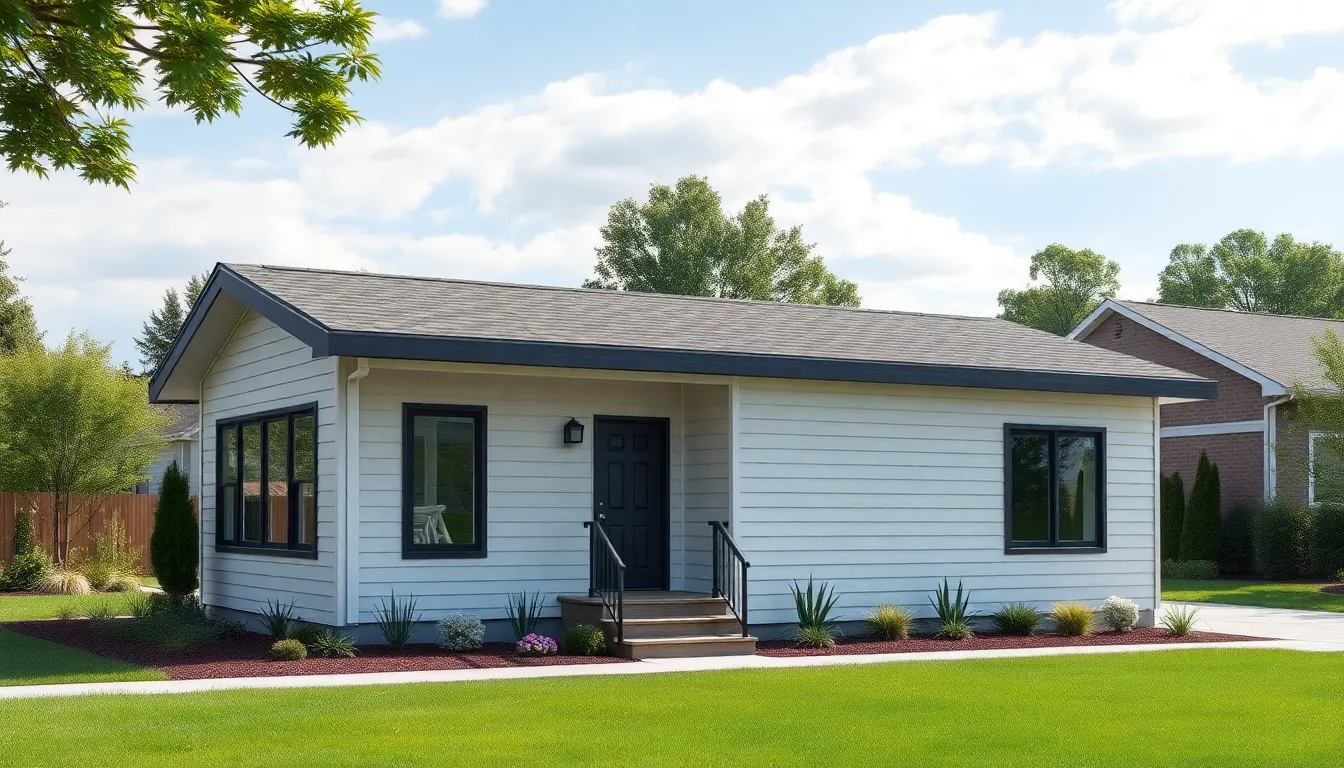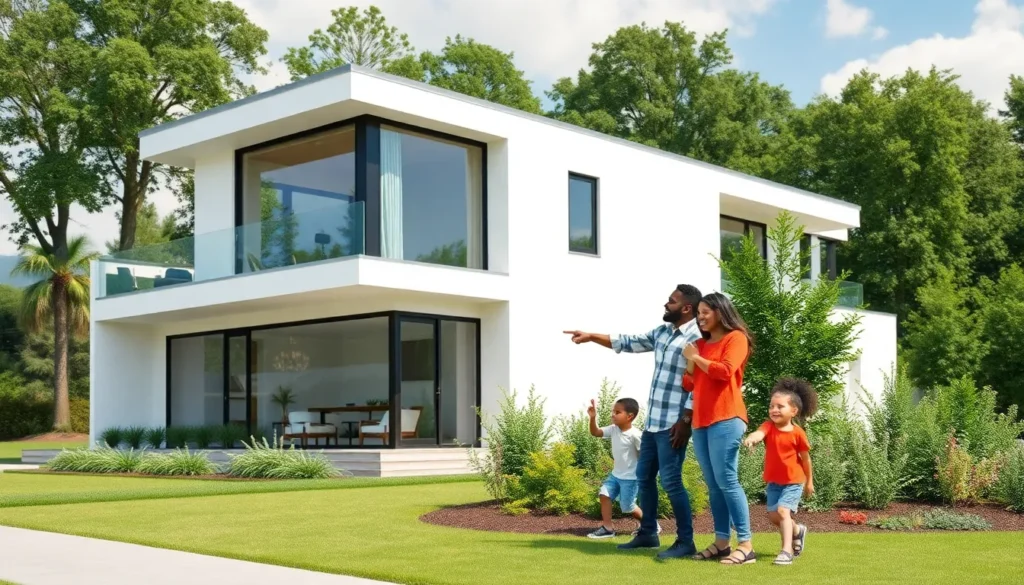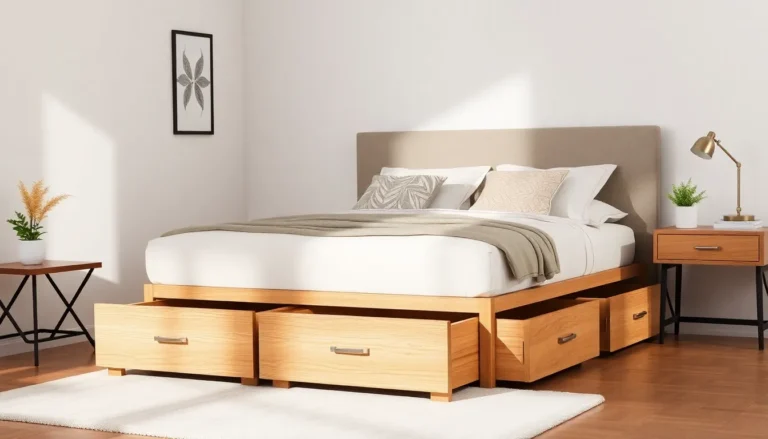Table of Contents
ToggleImagine a home that’s not just built, but assembled like your favorite childhood LEGO set. That’s the magic of modular homes. These innovative dwellings are crafted in sections, or modules, and then transported to their final destination, where they’re pieced together faster than you can say “mortgage.”
Overview of Modular Homes
Modular homes represent a modern approach to housing that emphasizes efficiency and sustainability. These homes consist of prefabricated sections, known as modules, constructed in a factory setting, which ensures consistent quality and reduced construction timelines. After production, modules are transported to the building site for quick assembly, minimizing disruption.
Transporting modules can occur via truck or rail, providing flexibility in delivery options. The assembly process typically takes a few days, significantly speeding up the overall timeline compared to traditional construction methods. This efficiency often results in lower labor costs and fewer material expenses.
Homebuyers appreciate modular homes for their customizability. Buyers can select various designs, layouts, and finishes, allowing for personalization while maintaining efficiency. Additionally, various energy-efficient features often come standard, such as better insulation and energy-efficient windows, ultimately reducing utility costs and enhancing sustainability.
Environmental benefits contribute to the appeal of modular homes. Factory construction generates less waste compared to traditional on-site methods, with many manufacturers prioritizing sustainable materials and practices. The carefully controlled environment of the factory minimizes risks from weather-related delays, allowing for predictable project timelines.
Modular homes not only provide cost-effective housing solutions but also offer modern aesthetics combined with functional design. With increasing demand for affordable housing, these homes present an innovative option for a wide range of buyers, making them a valuable addition to the housing market.
Advantages of Modular Homes

Modular homes provide numerous benefits that appeal to modern homeowners. Their design and construction process leads to distinct advantages in cost-effectiveness and customization.
Cost-Effectiveness
Modular homes offer significant savings compared to traditional builds. Construction occurs in controlled factory conditions, which reduces waste and minimizes delays. Labor costs typically decrease because assembly happens quickly on-site. These homes often include energy-efficient features, contributing to long-term savings on utility bills. Overall, the price range for modular homes generally falls between $100 and $200 per square foot, depending on various factors like design complexity and location. Buyers frequently find that choosing a modular home leads to reduced expenses while still achieving a high-quality dwelling.
Customization Options
Homeowners enjoy numerous customization options with modular homes. Various designs, layouts, and finishes enable buyers to tailor their homes to personal preferences. Many manufacturers allow clients to select cabinetry, flooring, and exterior finishes that suit their style. Flexibility in floor plans means homeowners can create functional spaces that meet their lifestyle needs. Some companies even offer eco-friendly material options, catering to those focused on sustainability. This breadth of choices ensures that modular homes can reflect individual taste while maintaining a modern aesthetic.
Disadvantages of Modular Homes
Modular homes come with various disadvantages that potential buyers should consider. While they offer many benefits, challenges exist that may impact the overall experience.
Financing Challenges
Securing financing for modular homes can sometimes prove difficult. Traditional lenders may view these homes as unconventional, leading to stricter loan terms. Heavier down payments often accompany these loans, impacting affordability. Some financial institutions might only offer specific types of loans, limiting choices for buyers. Lenders may require an appraisal, which could further complicate financing approvals. Understanding these challenges helps potential buyers plan more effectively.
Limited Design Flexibility
Customization options for modular homes are limited compared to traditional builds. While manufacturers offer various choices, rigid construction schedules can restrict alterations during the building process. Unique features may be harder to incorporate due to factory constraints. Limited exterior options may not appeal to homeowners seeking distinct aesthetics. Additionally, pre-set floor plans can limit personalization and make it difficult to accommodate specific needs. These factors could hinder the vision many buyers have for their perfect home.
Quality and Safety Standards
Modular homes adhere to strict quality and safety standards throughout the construction process. Each home undergoes evaluations during factory assembly to ensure compliance with local building codes. These guidelines cover essential components such as structural integrity, electrical systems, and plumbing. Significant attention to quality control results in homes that meet or exceed expectations.
Manufacturers engage certified professionals for inspections, ensuring every module is built to specification. Regular testing of materials contributes to overall safety, reinforcing the commitment to high standards. Each home’s design considers energy efficiency, incorporating features that lower utility costs and enhance comfort.
Safety features integrated into modular homes include fire-resistant materials and reinforced structures. These elements provide peace of mind, especially in areas prone to extreme weather events. Modular homes demonstrate resilience through rigorous testing, ensuring they withstand environmental challenges.
Various states have specific regulations governing modular construction, reinforcing safety and quality benchmarks. By adhering to these standards, manufacturers contribute to the credibility of modular homes in the housing market. Homebuyers benefit from these established protocols, ensuring their investment aligns with modern safety and design expectations.
Investing in a modular home combines innovative design with stringent quality and safety practices. The industry’s commitment to maintaining high standards reflects a dedication to building durable, safe living spaces. As they continue to gain popularity, modular homes represent a reliable housing option that combines efficiency, customization, and peace of mind for buyers.
Popular Modular Home Manufacturers
Several prominent manufacturers lead the market in modular home production. Modular Home Builders offers customizable solutions with a focus on sustainability and efficiency. Their homes reflect modern architecture and energy efficiency, appealing to environmentally-conscious buyers.
Giant Modular specializes in luxury modular homes that combine elegance with innovative design. This manufacturer emphasizes high-quality materials and personalized layouts, ensuring that customers receive tailored options.
Palm Harbor Homes stands out for its wide range of affordable models. Known for durability and practical layouts, this company attracts first-time homebuyers seeking value without compromising quality.
Blu Homes integrates eco-friendly technology into its building process. This manufacturer focuses on high-performance homes, showcasing a range of contemporary designs and sustainable features.
Kota Homes targets the affordable housing market with simple yet stylish designs. The company prioritizes efficiency and functionality, often appealing to families and individuals looking for cost-effective solutions.
Leading Edge Design creates custom modular homes with a focus on craftsmanship. Their commitment to quality construction and design flexibility makes it a top choice among discerning buyers.
Ritz-Craft manufactures modular homes featuring traditional and modern designs. With a strong reputation for quality and service, this family-owned business has built a loyal customer base.
Each of these manufacturers contributes to the growing popularity of modular homes, offering diverse options that cater to various preferences and budgets.
Modular homes stand out as a forward-thinking solution in today’s housing market. Their efficient construction process and customization options make them appealing to a wide range of buyers. With significant cost savings and a focus on sustainability, these homes are not just a trend but a viable alternative for modern living.
While challenges exist in financing and customization, the benefits often outweigh the drawbacks. As manufacturers continue to innovate and adhere to strict quality standards, modular homes are poised to meet the growing demand for affordable housing. Embracing this option can lead to a unique and satisfying homeownership experience.




